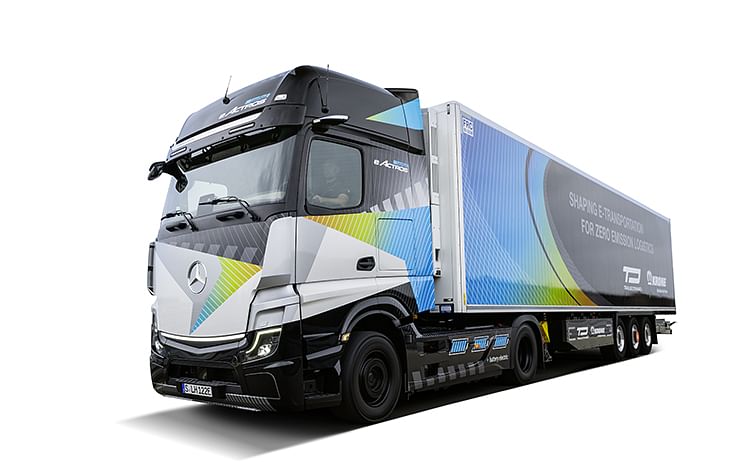Mercedes-Benz Trucks electrifies delivery to its largest plant
Relies on e-trucks in its own supply chain and engages in close cooperation with freight forwarders in realigning fleets and logistics operations to electric mobility at its plant in Worth, Germany.
Mercedes-Benz Trucks is driving forward the transformation of the transport industry toward CO2-neutral drive systems and focusing on e-trucks also in its own supply chain. The truck manufacturer has set itself the ambitious goal of 100 percent electrification of delivery traffic to its largest truck plant, in Worth, Germany, by the end of 2026, making a significant part of direct supply chain CO2-neutral.
Together with logistics service providers and the freight forwarders who supply the largest Mercedes-Benz Trucks plant on a daily basis, the company is working to increasingly integrate electrically powered trucks into their fleets. Following the series-production launch of the Mercedes-Benz eActros in 2021, the company is driving forward the mantra of practicality of e-trucks in the transport industry by meeting its diverse requirements. Plans include setting up a charging infrastructure in the Wurth plant, which will be available to both suppliers’ and the company's vehicles.
Several freight forwarders will be participating in the pilot phase, which is scheduled for implementation in 2023. In the coming year the first fully electric deliveries will be made to the Mercedes-Benz plant in Wurth among others those from its sister plants. In the pilot phase electrically powered Mercedes-Benz eActros 300 tractors will be utilized. Later, the eActros LongHaul and other models will be added.
Holistic transport solution
"Electromobility in the transport industry is already working today in numerous application fields," says Karin Radstrom, CEO Mercedes-Benz Trucks. "We want to drive the transformation of our industry forward quickly, which is why we are active on all levels of electrification. Therefore, we are going beyond vehicle development, manufacturing and providing accompanying services. We are working intensively on the electrification of our own direct supply chains. There is great potential here, as well as great interest among our partners, whom we are strongly supporting on this path."
The core of Mercedes-Benz Trucks' concept for battery-electric long-distance transport is to offer customers a holistic transport solution comprised of vehicle technology, consulting, charging infrastructure and services. In order to develop a targeted concept for zero-emission delivery logistics to the Wurth plant the first step is to work with freight forwarders to analyse their regular routes. This provides information on travel times and distances between delivery locations, charging options and individual truck ranges. They also receive support integrating e-trucks into their existing fleets and in realigning their logistics centers, including advice on setting up the appropriate in-house charging infrastructure. In a next step, plans are to extend this process to other plants in the Mercedes-Benz Trucks production network.
An integral part of the future inbound logistics concept of Mercedes-Benz Trucks for emission-free delivery traffic includes establishing a charging infrastructure at the Worth site. Approximately 50 charging columns, including megawatt charging stations for high-performance battery charging, are planned at key points for delivery traffic in the immediate vicinity of production at the plant. Parts used in production are delivered just-in-time to the assembly line. In the future, the time during which the e-truck's cargo is unloaded will be used to recharge the vehicle's battery. In this way, the vehicle ideally does not have to schedule further downtime and can resume its route directly after parts delivery. In addition, the possibility of re-bundling and thus optimizing delivery flows in the transport network in a new consolidation centre near the site is currently being examined.
eActros LongHaul will have a 500km range on one charge; megawatt charging of lithium-ion phosphate cell batteries achieves 20 to 80% in less than 30 minutes.
Series production launch of eActros 300 tractor unit in 2023
The eActros LongHaul, which is important for the long-haul segment, is scheduled to be ready for series production in 2024. The series-production vehicle has a range of around 500 kilometres on a single battery charge and will be capable of high-performance or so-called megawatt charging. The series-production launch of the Mercedes-Benz eActros 300, also recently presented as a semitrailer tractor variant for flexible heavy distribution transport, is planned for next year. As early as 2030 commercial vehicles that are CO2-neutral in driving mode are expected to account for up to 60 percent of Daimler Truck sales in EU30 markets.
Mercedes-Benz Trucks’ largest truck assembly plant was founded in Worth am Rhein in 1963 and produces the Mercedes-Benz Arocs and Atego trucks – as well as the Actros, which has been the world's most successful heavy-duty truck for more than 20 years. The Mercedes-Benz special trucks Econic, Unimog and Zetros are also built here.
RELATED ARTICLES
Autoliv Plans JV for Advanced Safety Electronics With China’s HSAE
The new joint venture, which is to be located strategically near Shanghai and close to several existing Autoliv sites in...
JLR to Restart Production Over a Month After September Hacking
Manufacturing operations at the Tata Group-owned British luxury car and SUV manufacturer were shut down following a cybe...
BYD UK Sales Jump 880% in September to 11,271 units
Sales record sets the UK apart as the largest international market for BYD outside of China for the first time. The Seal...






 By Autocar Professional Bureau
By Autocar Professional Bureau
 25 Nov 2022
25 Nov 2022
 5699 Views
5699 Views





 Ajit Dalvi
Ajit Dalvi




